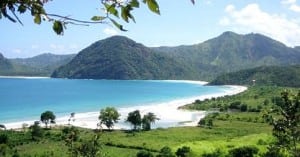
The Jakarta Post
The government aims to attract 5 million Muslim tourists from the Middle East and other parts of the world in the next three years, more than double the 2 million expected this year.
Tourism Minister Arief Yahya said that Indonesia, which has become a top tourist destination for travelers from Organization of Islamic Cooperation (OIC) countries, would provide more halal tourist destinations to further lure more tourists from the region.
He said that the government would introduce halal certification for foods and hotels in major tourist destinations so that Muslim tourists would feel at ease when traveling in the country.
Halal tourism is a travel concept that provides services in line with Islamic regulations. Hotels in such destinations, for example, do not serve alcohol and provide separate swimming pools and spa facilities for men and women.
“Because the market wants halal-certified food products, then we should follow market demand,” Arief said.
The government has carried out efforts to improve the country’s halal tourism, such as by forming a team tasked with promoting halal tourism and preparing 10 halal tourist destinations — including Lombok, West Sumatra and Aceh, according to Tourism Ministry marketing director general Sapta Nirwandar.
Several improvements will be made to public facilities with the addition of prayer facilities and washrooms, Sapta added.
According to the 2016 Global Muslim Travel Index (GMTI) study released on Wednesday by MasterCard and an authority on halal-friendly travel, CrescentRating, Indonesia jumped two places to take the fourth spot behind Malaysia, the United Arab Emirates (UAE) and Turkey in 2016.
“Indonesia’s awareness of providing halal services for Muslim travelers has been increasing, so that resulted in the country climbing two spots from last year,” MasterCard Global Products and Solutions group executive for Asia Pacific, Matthew Driver, said, adding that Indonesia also offered a variety of tourist destinations.
The GMTI looks at in-depth data covering 130 destinations that were scored against a backdrop of criteria — including level of services and facilities it provides, accommodation options, marketing initiatives, as well as visitor arrivals. Each criterion was then weighted to make up the overall index score.
Indonesia had an Index score of 70.6, while Malaysia scored 81.9, followed by the UAE at 74.7 and Turkey at 73.9.
Driver said that Indonesia must understand the needs and preferences of Muslim travelers if the country wanted to catch up with Malaysia, UAE and Turkey by providing halal food services, prayer facilities and washrooms, because water played a key role in purity and cleanliness for Muslims.
The study also revealed that the Muslim travel market continued to be one of the fastest-growing segments in the global travel industry, and that Muslim travelers were increasingly looking at destinations that took their needs into account.
There was an estimated 117 million Muslim visitor arrivals globally last year, representing close to 10 percent of the entire travel market. This is projected to grow to 168 million visitors by 2020, when travel expenditures for Muslim travelers are expected to exceed US$200 billion. (vny)



